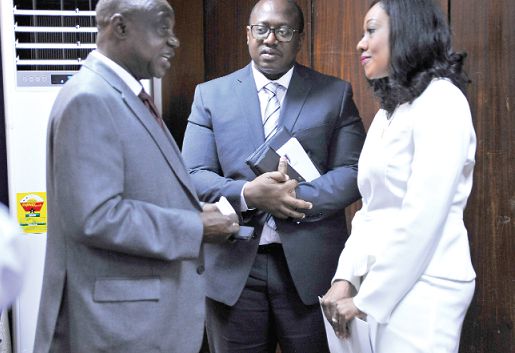
ROPAA Committee inaugurated to implement road map
After 12 years of the promulgation of the Representation of the People's Amendment Act (ROPAA), 2006 (Act 699), the Electoral Commission (EC) has set up a nine-member committee to come up with a road map for the implementation of the law.
The establishment of the committee follows a judgment by the Human Rights Division of the Accra High Court in December 2017 that ordered the EC to implement the ROPAA in one year.
The committee, made up of representatives from the EC, political parties and civil society organisations, is chaired by the Deputy Chairperson of the EC in charge of Corporate Affairs, Dr Eric Bossman Asare.
Other members of the committee are: Ms Adjoa Abrefa Asuama, EC; Mr Christian Owusu-Parry, EC; Mr John Boadu, the New Patriotic Party (NPP) and Dr Benjamin Kumbour, the National Democratic Congress (NDC).
The rest are Dr Kojo Asante, Centre for Democratic Development (CDD); Professor Ransford Gyampo, University of Ghana, and Reverend Dr Ernest Adu Gyamfi, National Peace Council (NPC).
As of the time of the inauguration, which was held in Accra yesterday, one person to be nominated by the rest of the minority parties, including the Progressive People’s Party (PPP), the People’s National Convention (PNC) and the Convention People’s Party (CPP) to represent them on the committee had not been decided by the parties involved.
The committee "shall commence sitting" in January 2019 and "shall present its final report" to the commission by the end of May, 2019.
Background
On December 18, 2017, the Human Rights Division of the Accra High Court, presided over by Mr Justice Anthony Yeboah, gave the EC a one-year ultimatum to implement the ROPAA.
The order, according to the court, was to ensure that Ghanaians outside the country registered and voted in the 2020 elections.
The court said the EC must “uphold and ensure the full compliance of the operationalisation of Act 699’’ within the 12-month period by laying before Parliament, a Constitutional Instrument (CI) that will set out the modalities for the implementation of Act 699.
In the event that the EC has any justifiable reason and is “unable to comply with the order”, the court ordered the commission to publish the justifiable reason(s) 30 days before the expiration of the deadline and also appear before the court to explain the reason(s).
Failure by the EC to implement the ROPAA, the court held, was a violation of the fundamental human rights of Ghanaians in the diaspora, whose right to vote had been guaranteed by the 1992 Constitution, which was made effective by the ROPAA.
The landmark judgement was as a result of a legal battle between five Ghanaians resident in the United States of America and the EC over the failure of the commission to implement ROPAA.
They were Dr Kofi A Boateng, Ms Nellie Kemevor, Mr Obed Danquah, Mr Christine Sillim and Mr Agyenim Boateng.
Specific duties
Inaugurating the committee, the Chairperson of the EC, Mrs Jean Mensah, explained that the committee was to, among other functions, research on countries that were implementing ROPAA and how it had been implemented there.
The committee, she added, was to hold a stakeholder consultation to seek the views of key stakeholders, including the media on the subject and review any previous proposals made on its implementation after which they would produce a report, spelling out the modalities for the implementation of the ROPAA.
She, therefore, charged the members of the committee to work assiduously towards meeting the May 31, 2019 deadline.
“At the end of the work of the committee, a technical group will be constituted to draft regulations for external voting which will eventually be passed into a constitutional instrument by Parliament. This is expected to be in place by the end of December, 2019,” she stated.
Appreciation
In his remarks, Dr Asare expressed appreciation to Mrs Mensah for the confidence reposed in the members of the committee and gave an assurance that they would explore all avenues and come out with the needed information that would enhance the successful implementation of the Act.
He further indicated that in spite of the challenges that would confront the implementation of the ROPAA, the EC was committed to ensuring its successful implementation and called on all stakeholders to support them.
Concerns
Meanwhile, some representatives of the minority parties who were present at the meeting, expressed dissatisfaction at the EC’s decision to give them a single representation on the committee.
Describing the move as a “deliberate attempt by the EC to make us lose our relevance” in Ghana’s political discourse, some of them accused the commission of failing to write to them formally to inform them about the exercise.
In an interview with the Daily Graphic after the ceremony, the Chairman of the NDC, Mr Samuel Ofosu-Ampofo, who was present at the meeting, expressed worry at the manner in which the EC was carrying out the implementation process of the ROPAA and called for a broader consultation on the subject beyond the committee level.
While expressing satisfaction at the EC’s efforts towards the implementation of the ROPAA, the General Secretary of the NPP, Mr John Boadu, however, proposed the addition of a representative from Parliament since “it would be passed into a constitutional instrument by Parliament.”
Responding to some of the issues, Mr Owusu-Parry, who is the Secretary to the Committee, explained that all matters relating to the formation of the committee were widely discussed at an Inter-Party Advisory Committee (IPAC) meeting held in October this year and that the EC did no wrong in that regard.
